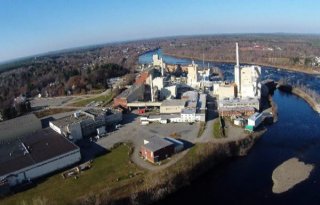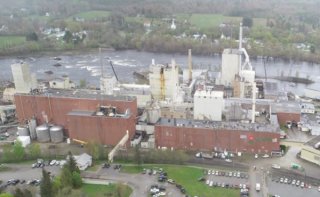R1 Success Story: Old Town Paper Mill, Old Town, Maine

EPA Grant Recipient:
Old Town, Maine
Grant Types:
Assessment
Current Use:
Paper Mill Specializing in Recycling
Former Use:
Paper Mill
Download Success Story:
Old Town Paper Mill, Old Town, Maine (pdf)
While the past few decades have seen the closing of many Maine lumber and paper mills, the City of Old Town was able to keep its mill open through significant investment in the 200-acre former paper mill. In 2018, Old Town Paper Mill purchased the site and restarted the 150-year-old pulp and paper mill on the banks of the Penobscot River. Old Town Paper Mill re-opened the doors of the mill on August 2019 and began manufacturing high quality unbleached pulp. Since buying the mill, the company has invested more than $46 million for repairs and improvements, hired more than 130 full time workers along with 300 contract workers, and begun planning for future expansion.
Once the largest supplier of lumber in the United States, the City of Old Town was home to several industrial mills built along the Penobscot River in the mid- to late 1880s. A sawmill began operation at the site in 1860, and the Penobscot Chemical Fiber Company was established there in 1882. Since that time, the mill has produced pulp and paper products, and expanded its footprint to include a pulp mill, pulp driers, lime kiln, tissue mill, wood rooms, atlas silos, water pump stations and warehouses, and a wastewater treatment plant.
Between 2003 and 2015, the mill went through a series of layoffs and shutdowns, with the final shutdown in 2015. When the mill shut down in 2015, not only were 350 workers left without a job, but the buildings and remaining site were a contaminated blight on the downtown. Asbestos- clad buildings began to deteriorate, petroleum and heavy metal- contaminated soils remained, and the containers, tanks, and hazardous chemicals left were a threat to humans and the environment.
Priming the Property for Redevelopment
The City of Old Town, through its Brownfields assessment grant from EPA, performed a detailed investigation to determine the extent of contamination and what cleanup activities were needed. With help from local, state and federal grants, the city developed environmental, brownfield, monetary, and marketing campaigns, which attracted a buyer. This information was vital in marketing the site to potential buyers, and Old Town Paper Mill has used this information as a key factor in its due diligence and purchase decision before redeveloping it.
EPA FUNDING
2016- EPA Brownfields Assessment Grant- $175,000 Old Town used the brownfields assessment grant funding to determine the nature and extent of contamination at the property.
OTHER FUNDING: 2019- Old Town Paper Mill private investment of about $46 million
"The City of Old Town has benefited greatly over the last 8 years because of the on-going EPA Brownfields Program. The combined efforts of Maine DEP and EPA has allowed an idled pulp mill site the opportunity to have another chance. Without the grants being available, the City would not have been able to conduct the Phase I and Phase II Environmental Site Assessments at the mill site. There were 20 other potential sites in the U.S. competing with the Old Town site and the due diligence that happened because of the EPA grants assisted Old Town Paper Mill in determining this location as a site to resurrect. This has brought 130 full time jobs back into the community and impacts the entire region for many businesses associated with the paper industry. "
Bill Mayo, City Manager
Old Town, Maine
Today

Old Town Paper Mill is currently ramping up production to its preliminary target of 425 metric tons of pulp per day, and planning to increase output even further in the near future. They aim to be a global leader in environmentally sustainable pulp and paper products and strive to make every aspect of their production, from sourcing and manufacturing to distribution, environmentally friendly. Old Town Paper Mill is committed to environmental sustainability and advocates the reduce, reuse, recycle model of economic development.

For more information:
Visit the EPA Brownfields website at www.epa.gov/brownfields or contact Jim Byrne at 617-918-1389 or byrne.james@epa.gov.
EPA 560-F-19-217
November 2019
